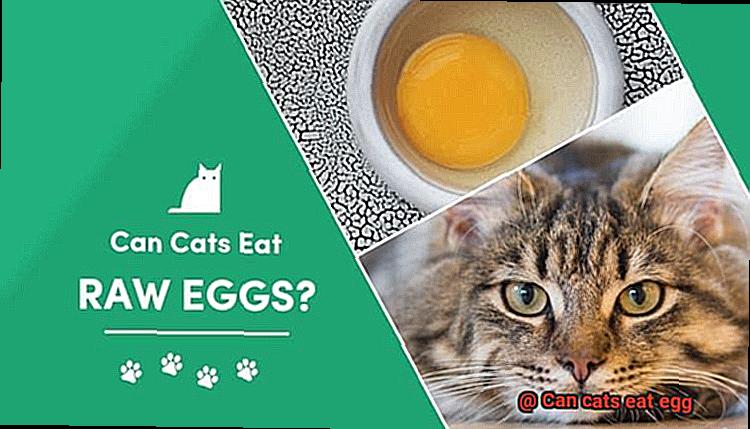As a cat owner, you want nothing but the best for your feline friend. And while you may be aware that cats love their meat and fish, have you ever wondered if they can eat eggs? Well, the answer is yes – but there’s more to it than just a simple “yes.”
Eggs are packed with protein and amino acids, which are essential for your cat’s overall health and well-being. In fact, some cat foods even include eggs as an ingredient because of their protein-rich benefits. However, like with any food, there are potential risks associated with feeding eggs to cats.

Most cats can handle eggs without any issues, but some may develop an allergy to them. This can result in vomiting, diarrhea, and other unpleasant symptoms. Additionally, raw eggs pose a risk of salmonella – a harmful bacteria that can cause serious health problems for both cats and humans.
But don’t worry. There are ways to make eggs safe for your furry friend to enjoy. Cooking eggs thoroughly kills off dangerous bacteria while also making them more appealing to your picky eater. Before introducing eggs into your cat’s diet though, it’s always best to consult with your veterinarian first.
In this blog post, we’ll dive deeper into whether or not cats can eat eggs and explore their nutritional value. We’ll also discuss the potential risks associated with feeding them eggs and provide tips on how to prepare them safely for your feline companion.

By the end of this post, you’ll have all the information you need to decide if feeding your cat eggs is right for them.
Can Cats Eat Eggs?
There are a few important things to keep in mind before adding eggs to your cat’s food bowl.
Firstly, it’s crucial to remember that cats are obligate carnivores, meaning they require a diet high in animal-based protein. While eggs are a good source of protein, they should not replace the primary source of protein in your cat’s diet. Instead, consider eggs as a nutritious supplement to their regular meals.
Eggs offer several health benefits for cats, including essential amino acids that aid in building and repairing tissue and vitamins A and B12 that promote eye and skin health and support the production of red blood cells.
When serving eggs to your cat, always cook them thoroughly. Raw eggs can contain harmful bacteria such as salmonella and E. coli that can cause food poisoning in cats. Additionally, raw egg whites contain avidin, which can interfere with biotin absorption in your cat’s body. Cooking eggs thoroughly neutralizes these risks and ensures that your cat can safely consume them.

It’s also crucial to serve plain cooked eggs without any spices or seasonings. Cats have sensitive digestive systems, and any added spices could cause stomach upset or other health issues. Furthermore, some cats may be allergic to eggs, so watch for any signs of an allergic reaction such as vomiting, diarrhea, or skin irritation.
Benefits of Eating Eggs for Cats
A balanced diet that provides all the essential nutrients is crucial for maintaining your cat’s health. While cat food options are widely available, introducing some variety into your cat’s diet can be a great way to amp up their nutrition. One such option is eggs. Yes, you read it right – cats can benefit from eating eggs too.

Eggs are a powerhouse of nutrients that provide multiple health benefits for cats. Firstly, they are an excellent source of protein that is essential for maintaining healthy muscles, organs, and tissues. The amino acids found in eggs are vital for cats’ overall health and development.
Apart from protein, eggs are also loaded with vitamins and minerals like vitamins A, D, E, and B1These nutrients work together to promote healthy skin and coat, strong bones, and a robust immune system. The high levels of biotin found in eggs help to keep your cat’s skin and fur healthy and vibrant.
Eggs are also rich in healthy fats that help to keep your cat’s skin moisturized and reduce inflammation. The yolk of an egg contains omega-3 fatty acids that are beneficial for cats’ overall health and can help to reduce the risk of heart disease and other health issues.
While eggs offer many benefits for cats, it’s important to keep their intake in check. Overfeeding your cat with eggs can lead to obesity or digestive issues due to the high-fat content. It’s recommended to limit egg consumption to one or two per week as part of a balanced diet.
Precautions to Take When Feeding Your Cat Eggs
While eggs can be a tasty and nutritious treat for cats, it’s important to take precautions when feeding them.
Firstly, it’s crucial to note that eggs should only be given as an occasional treat. They contain protein and other nutrients that can benefit your cat’s health, but they shouldn’t be a regular part of their diet.
When feeding your cat eggs, the first precaution to take is to ensure they are fully cooked. Raw or undercooked eggs can contain harmful bacteria like salmonella, which can cause illness in both cats and humans. Also, make sure to remove the shell before serving the egg to your cat as it poses a choking hazard.
Portion control is also essential when feeding eggs to your cat. While they can be beneficial in moderation, too much can lead to digestive issues like diarrhea and vomiting. The recommended amount is no more than half an egg per week.

If your cat has any pre-existing health conditions like pancreatitis or kidney disease, it’s best to consult with your veterinarian before introducing eggs or any new food. And if you notice any discomfort or illness after giving your cat eggs, such as vomiting or diarrhea, stop immediately and consult with your vet.
How to Prepare Eggs for Your Cat
Cats are known for their picky eating habits, but eggs can be a great way to add protein and other essential nutrients to their diet. However, it’s important to know how to prepare them safely and in a way that your cat will enjoy. Here are five sub-sections that will guide you on how to prepare eggs for your cat in a safe and nutritious way:
Thoroughly cook the eggs
As mentioned earlier, raw eggs can contain harmful bacteria that may cause illness in cats. Therefore, it’s crucial to cook the eggs thoroughly before feeding them to your furry friend. Hard-boiled or scrambled eggs are great options that are easy to prepare. Make sure the egg is fully cooked, and there’s no runny yolk left.
Avoid adding seasonings or spices

Seasonings like salt, pepper, or herbs can be harmful to cats and may cause digestive problems or other health issues. Therefore, it’s best to avoid any added ingredients when preparing eggs for your cat. A simple hard-boiled egg is nutritious enough on its own.
Introduce new foods slowly
Cats have varying degrees of tolerance for new foods, so it’s always best to introduce new foods gradually. Start with small amounts of egg and monitor your cat’s reaction closely. If they show signs of an upset stomach or any negative side effects, stop feeding them eggs immediately.
Eggs should not be the main source of nutrition
While eggs can provide some nutritional benefits such as protein, vitamins, and minerals, they shouldn’t be the primary source of your cat’s diet. Cats need a balanced diet consisting primarily of animal proteins, so make sure you’re providing them with a well-rounded meal plan.
Avoid toxic ingredients
When preparing eggs for your cat, make sure you avoid any toxic ingredients such as onions or garlic. Stick with safe options like cooked chicken or fish that are also high in protein and other essential nutrients.
How Much Egg Should You Feed Your Cat?
While eggs can be a healthy source of protein and nutrients, overfeeding can lead to health problems such as obesity.
To keep your cat healthy, limit their egg intake to no more than one egg per week. This ensures they receive the benefits of eggs without any negative effects.
It’s important to note that cats should only consume cooked eggs. Raw eggs can contain harmful bacteria like salmonella, which can cause food poisoning in both cats and humans. Therefore, make sure to cook the egg thoroughly before serving it to your cat.
When preparing eggs for your cat, it’s best to avoid adding any seasoning or additives such as salt or butter. These ingredients can be harmful to your cat’s health and contribute to obesity. Instead, serve the egg plain or mix it into their regular food for extra flavor and nutrition.
Potential Allergies in Cats When Eating Egg
Eggs are a rich source of protein and can be a valuable addition to your cat’s diet if served in moderation and cooked thoroughly. However, like humans, cats can also develop allergies to certain foods, including eggs. Therefore, it’s crucial to understand the potential symptoms of egg allergies in cats and what steps to take if you suspect your cat may have an allergy.
Symptoms of egg allergies in cats can range from mild to severe and may include vomiting, diarrhea, itching or swelling around the face or ears, and difficulty breathing. These symptoms can be alarming and require immediate medical attention. If you notice any of these symptoms after feeding your cat eggs, it’s critical to take them to the vet for a proper diagnosis.
Your vet may suggest an elimination diet to determine if eggs are indeed the culprit. An elimination diet involves removing all potential allergens from your cat’s diet and then gradually reintroducing them one by one while monitoring for any adverse reactions.
If your cat is diagnosed with an egg allergy, it’s best to avoid feeding them eggs altogether. Although egg allergies in cats are relatively rare, they can still occur. So if you decide to feed your cat eggs, start with a small amount and watch them closely for any adverse reactions.
It’s important to note that there are several benefits of feeding your cat eggs as a source of protein. They’re not only highly digestible but also contain essential nutrients such as amino acids and vitamins. However, it’s vital to ensure that the eggs are cooked thoroughly and served plain without any added seasonings or ingredients that may trigger an allergic reaction.
Signs of an Allergic Reaction in Cats After Eating Egg
However, it can often be a tricky task to pinpoint what could be causing your cat discomfort or illness. If you suspect that your cat has an egg allergy, it is crucial to know the signs of an allergic reaction.
One of the most common signs of an allergic reaction in cats is vomiting or diarrhea. These symptoms could indicate that the body is trying to eliminate the allergen – in this case, egg. Additionally, keep a close eye out for skin irritation or itching, which may present as redness, swelling, or hives.
Another alarming symptom of an allergic reaction in cats is respiratory distress. Your cat may experience wheezing, coughing, or difficulty breathing. In severe cases, anaphylactic shock can occur, which requires immediate medical attention.
It’s worth noting that some cats may not display any signs of an allergic reaction until they’ve consumed egg multiple times. Therefore, if you believe your cat may be allergic to egg, it’s essential to monitor their behavior closely after each exposure.
Remember, allergic reactions in cats can be life-threatening and require swift treatment. If your cat exhibits any of these symptoms after consuming egg, seek veterinary care immediately.
So, while eggs are a fantastic source of protein for cats when cooked thoroughly and given in moderation, it’s important to be aware of potential allergies. By understanding the signs of an allergic reaction in cats after eating egg and seeking veterinary care if necessary, you can help ensure your furry friend stays healthy and happy.
Conclusion
In conclusion, the answer to whether cats can eat eggs is a resounding yes, but with some important caveats. Eggs are an excellent source of protein and essential amino acids that can greatly benefit your cat’s overall health and well-being. However, it’s crucial to keep in mind that cats are obligate carnivores who require a diet high in animal-based protein. While eggs can certainly be part of a healthy feline diet, they should never replace the primary source of protein.
When serving eggs to your cat, always make sure they are cooked thoroughly and avoid adding any seasonings or spices. Raw eggs pose a risk of salmonella, which is dangerous for both cats and humans alike. Furthermore, raw egg whites contain avidin, which can interfere with biotin absorption in your cat’s body.
Despite these concerns, eggs offer several health benefits for cats. They contain essential vitamins and minerals that promote eye and skin health while supporting the production of red blood cells. However, it’s important to keep their intake in check as overfeeding can lead to health problems such as obesity.
If you suspect your cat may have an egg allergy, watch out for signs of an allergic reaction such as vomiting, diarrhea, skin irritation or itching, or respiratory distress. In such cases, seek veterinary care immediately.
By understanding the nutritional value of eggs for cats and taking necessary precautions when feeding them to your furry friend, you can ensure they receive all the benefits without any adverse effects.







